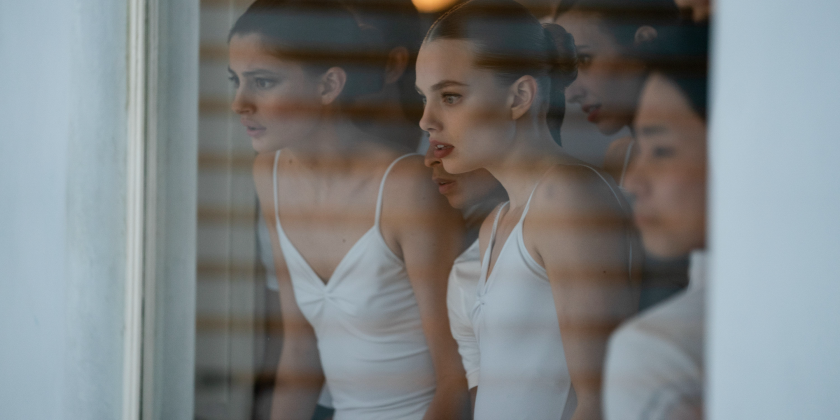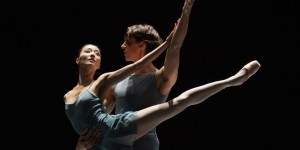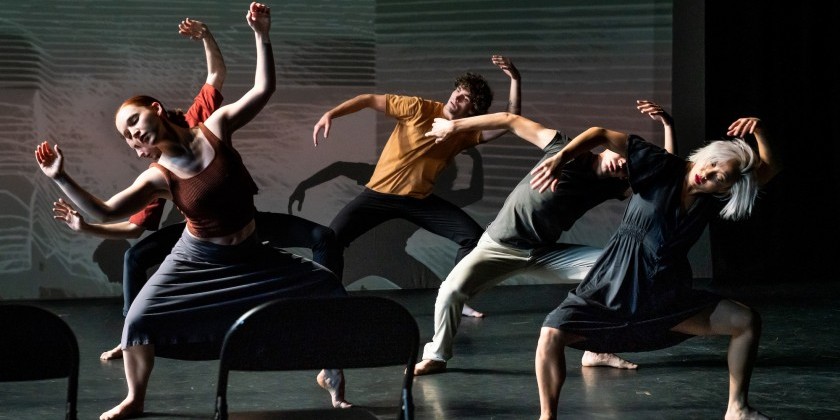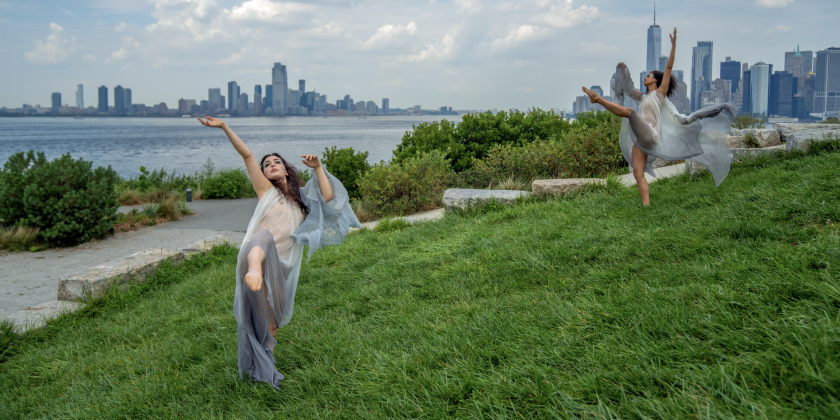IMPRESSIONS: "Birds of Paradise," an Amazon Original Movie with Diana Silvers, Kristine Frøseth, and Jacqueline Bisset

Release Date: September 24, 2021, on Amazon Prime Video HERE
Performance: Jacqueline Bisset, Vincent D'Onofrio, Kristine Frøseth, Caroline Goodall, Eva Lomby, Nassim Lyes, Diana Silvers
Direction and Screenplay: Sarah Adina Smith (based on the novel by A.K. Small)
Choreography: Celia Rowlson-Hall
Music: Ellen Reid // Cinematography: Shaheen Seth
Backstage can be very dark indeed. The lights illuminate who’s onstage—the sylphs, the swans, the princes for whom they swoon—while offstage, the young and the hungry wait their turn to bask in the spotlight. But that darkness isn’t quiet or still. An entirely different drama from the one happening onstage plays out. As technicians swap gels and stage managers call cues, up-and-coming dancers dream, scheme, and gossip about a choice role, a new lover, a weakness in a star they could exploit for personal gain.
Amazon’s new streaming film, Birds of Paradise, based on the novel by A.K. Small, luxuriates in the backstage, a place so teeming with inflated emotions and sordid impulses that the operatic tone turns on itself to become a piece of fluffy camp.

The plot hits all the tropes you’d expect from a movie about the seedy side of ballet. In no particular order, these include lying, cheating, stealing, drug-taking, bulimia, and bonking. Awkward but ambitious Kate (Diana Silvers) has placed first in ALL the competitions in the States, so she auditions for the school associated with the Paris Opéra Ballet. Apparently, neither Kate nor her teachers has heard of the many world-famous American companies. Why else would they direct her to Paris though she doesn’t speak French? She hopes to win “the prize” (yup, that’s what they call a company contract). To make this MacGuffin extra-special, the Paris Opéra Ballet—a massive, 154-member company—only accepts one male and one female dancer each year. If, at this point in the review, you have a hunch that virtually no one associated with this production possesses a passing knowledge of ballet, well, you’d be right.
Naturellement, drama ensues. In the first seven minutes, Kate catfights with Marine (Kristine Frøseth), whose name evokes marionette, which she is, although she thwarts the heavy hand of her deep-pocketed stage mother by harboring a desire to choreograph. Marine wants to win “the prize,” too, for her deceased twin brother Ollie, who threw himself off a bridge due to a plot point cribbed from Flowers in the Attic. The key to success, Kate and Marine believe, is partnering with Felipe, a.k.a. the Demigod, who’s given so little screentime that I barely recognized him when he did swagger through a scene.

Kate—all bumbles and blunders in a beret tip to Emily in Paris—offends Madame Brunelle (Jacqueline Bisset). A caricature of the cruel ballet mistress whose dedication to the bloodthirsty art of ballet has robbed her of basic human decency, Madame Brunelle posts a daily pecking order of the dancers and invites Kate to poison a rat. (I doubt it’s an intentional symbol, but the young, impoverished dancers of the 19th-century POB were known as petit rats.) Although Marine seems a shoo-in for “the prize,” don’t count Kate out. This girl has a can-do, can’t-get-me-down attitude, which includes befriending Marine only to flaunt her dirty laundry later and sleeping with anyone who can lift her up, up, and away to “the prize.” (Make it into a drinking game. I dare you.)
But what about the dancing, you ask. Isn’t that what we’re here for? Montages of lissome bodies twirling, leaping, and gliding as our hearts thunder at the beauty and derring-do?

Nope. Only splashes of dance occur, and when they do, doubles perform them for Kate and Marine. Nothing’s wrong with that since nothing’s worse than suspending disbelief that an actor with exactly six weeks of ballet training is the next Sylvie Guillem. Yet none of the dancers hail from the Paris Opéra Ballet, so if you’re hoping for the elegance and nuance of the French style, manage your expectations to nil.
As for the choreography by Celia Rowlson-Hall, it comes across as a thrown-together flurry of ballet basics and pas de deux staples with occasional capitulations to gravity for the contemporary vignettes. I checked, and Rowlson-Hall’s name appears sixth from the bottom on IMDB in a crew of at least a hundred. Perhaps the top brass didn’t understand the time and resources a choreographer needs to make memorable dances?

Birds in Paradise leans into the darkness, literally. The setting is Paris, which you won’t forget since the Eiffel Tower looms fetishistically in the background of many a window. The City of Light, though, must have had an electrical outage since they relocated filming to Budapest where the scenes unspool in dark rooms, dim hallways, and, once, a gothically gloomy underground club where the price of admittance is swallowing a worm. Milky light plays betwixt and between the darkness, an apt if obvious imagery of the film’s theme.
I know it sounds like I hated Birds of Paradise, but I didn’t. I really, really didn’t. I laughed more than I cried, which I doubt was the response the filmmakers were hoping for. But I sure can get behind an entertaining melodrama where over-the-top characters have no qualms about wildly misbehaving.

What got me was the lack of respect shown to ballet, an art form with an almost 500-year history. That’s from the minor points—to her initial audition, Kate wears her hair in a long French braid topped with a plastic headband—to the major—Marine replaces the official audition pas de deux with a solo chock-a-block full of heart-clutching and sonically disturbing falls to the floor while wearing soft slippers (it’s an homage to the mad scene in Giselle). This renegade act is supposed to demonstrate her heart isn’t in it anymore, and it does in the best and most original scene where movement conveys character motivation and inches the plot forward. Yet, to the judges, it means she’s a contender to join an elite, hierarchical, pointe-shoe-wearing company.
No way. It’s an insult to those of us who’ve wrung all the saltwater (sweat, tears) out of ourselves in pursuit of ballet.












